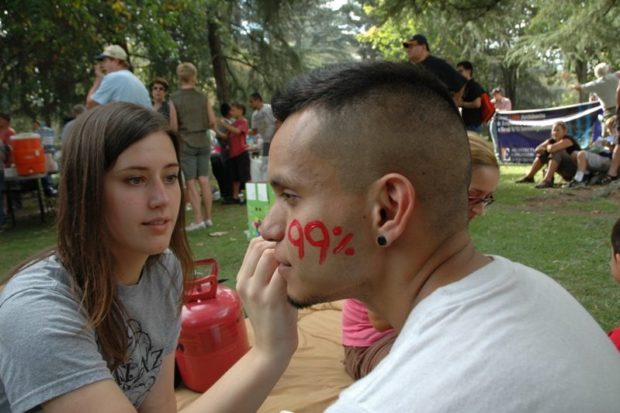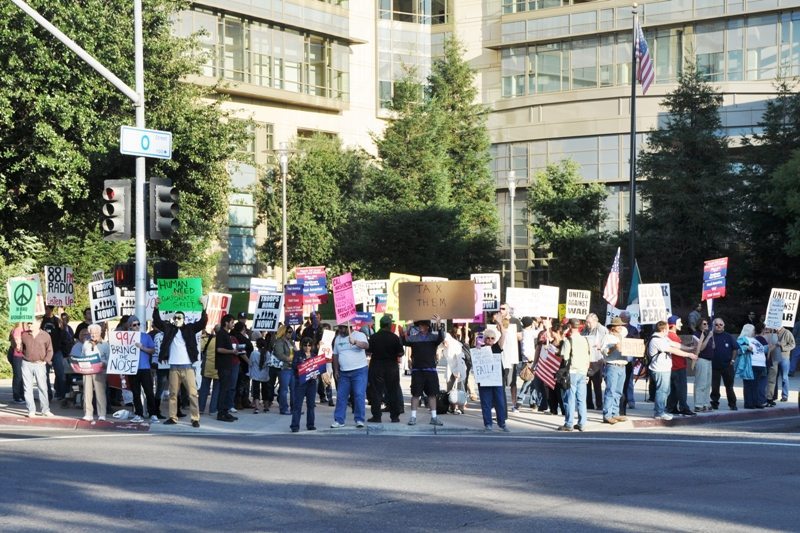
By Jesse Franz
 Since its beginning on Sept. 17, the Occupy Wall Street movement has spread to more than 100 cities around the country, from New York to California and Seattle to Miami.
Since its beginning on Sept. 17, the Occupy Wall Street movement has spread to more than 100 cities around the country, from New York to California and Seattle to Miami.
On Oct. 9, about 2,917 miles away from Wall Street, the movement came to the Central Valley. Calling themselves Occupy Fresno, protesters have continuously camped out in Courthouse Park for the past three weeks and plan to stay there indefinitely. Although their individual reasons for attending the occupation differ, the central theme of the demonstration seems to be the group’s aversion to what they see as greed and corruption, whether that be in America’s economic system, foreign policy or the practices of Fresno’s own local governing bodies.
Occupiers like Corri Moss comment that she attends the protest because, “Personally, I don’t agree with a lot of the things that have been going on, such as the corporations having the rights of individuals. They can invoke their Fifth Amendment rights. They don’t have to submit any paperwork that could compromise their integrity if they were doing such shady business…It feels like something’s gotta give somewhere.” 
Others, like community activist Gloria Hernandez, have donated time and resources in support of the protest because, as she said, “It reminds me a lot of my youth. It’s a new struggle; it’s a new civil rights issue. I think that it’s important that people start learning from each other, and we as older people come and share our history, and offer words of wisdom.”
One of the group’s central missions and talking points is the fight for the rights of what they call the “99%.” A blog, in connection with Occupy Wall Street, describes this as, “We are the 99 percent. We are getting kicked out of our homes. We are forced to choose between groceries and rent. We are denied quality medical care. We are suffering from environmental pollution. We are working long hours for little pay and no rights, if we’re working at all. We are getting nothing while the other 1 percent is getting everything.”
This sort of disillusionment in America’s economic system is what drove some like Joseph Hunter to join Occupy Fresno. “I kind of had this hope that [I would] go to school, and get out, and be able to work at a higher wage and get a good job to support a family. So that’s something that I worry about; I worry about my future and I worry about what it’s going to be like if I want to have kids later on down the road. What kind of life are they going to grow up in? What kind of opportunities are going to be afforded to them,” said Hunter.

Although Occupy Fresno spends the majority of its time continuously occupying Courthouse Park, the group has also organized protests and events separate from the encampment. On Oct. 15, they held “Occupy-Fest,” a community event at which donations of clothes, food, money and other supplies necessary for the continuation of the protest were accepted. The event also featured a performance by the Raging Grannies, spoken word, poetry and children’s entertainment. This was Occupy Fresno’s biggest event to date as it is estimated that around 200 people came out to show their support.
On Oct. 19, the group marched from the base in Courthouse Park to the Fresno Unified School District’s board meeting to protest what they say is greed by district administrators like Superintendent Michael Hanson. Hanson’s $277,000 yearly salary puts him in the 1% of America’s wealthiest citizens, and with schools going through some of the most massive budget cuts in history, some members of the community have called on him to take a pay cut and give the money to school programs.
During open forum, a time allotted to the public to speak on non-agenda items, the group repeatedly asked if the school board would put the discussion of a 25% pay cut for top administrators on the agenda for the next meeting. Occupy Fresno has estimated that the pay cut would open up around $10 million, which could be used to finance education. However, each time they asked, their request was ignored and the school board refused to acknowledge their questions.
At their next event, on Oct. 21, Occupy Fresno protested at Wells Fargo and Bank of America locations. The group protested in front of the buildings and encouraged people to withdraw any money that they had invested in those banks.

The Occupy Wall Street group attempted a similar action at Citibank in New York on Oct. 15. At that demonstration, people with bank accounts at the establishment attempted to withdraw their funds in protest of the bank’s policies. However, the banks manager called the police saying that they were disrupting business. Subsequently, a group of 23 Occupy Wall Street protesters were locked inside the Citibank building until police reinforcements could arrive to take them into custody.
Group spokesperson Angelica Chavez said of this incident, “We’re very much aware of this situation. I think that’s ridiculous. We talked to our lawyer about it…As far as I know they can’t (arrest you) as long as you’re there conducting business.”
With insight from their legal advisers, members of Occupy Fresno are confident that their demonstration will not have the same legal ramifications as Occupy Wall Street’s.
One major complaint, heard by protesters at Occupy movements around the nation, is the lack of what some have called “fair and unbiased” coverage by the media. Yielding signs like “The Revolution will not be televised” and “The media won’t report this, so I’m here to see for myself,” protesters have voiced concerns that their message is not getting out in the way that it should. With pundits and politicians alike calling the Occupy movements class warfare, and one of the leading Republican candidates for the presidential nomination, Herman Cain, saying that he believes this is a conspiracy by the Obama administration to cover up its “failed policies,” the claim that the protests are not being represented appropriately is not outlandish.
As Joseph Hunter said, “The misconception that I see the most is that occupiers want to take from the rich and give to the poor. I don’t want their money. I’m going to work for my money. I’m going to work for my money. But I want to have the potential to earn that money. And if they’re not putting back into the system, my ability to do that is a little less than it should be I think.”
The Fresno Police Department approached the Occupy Fresno group in the early days of the occupation asking protesters to obey city ordinances against having tents or sleeping in the park from midnight to 6 a.m. However, since then the police presence has been minimal in comparison to some Occupy protests around the country.
Occupy Fresno is currently accepting donations of food, water and other supplies that will help them in continuing their actions.
*****
Jesse Franz is a writer for various publications around Fresno. Contact him at jessefranzwriting@yahoo.com.

